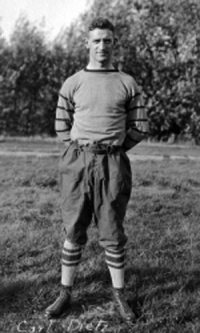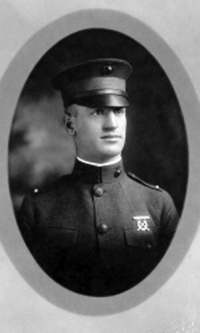Personal tools
Help
Tools
Class Notes
- Do you have news for fellow WSU alumni and other readers of Washington State Magazine? Send us your class note.
Our Story
written by alumni, faculty and friends.
NOTE: THIS IS A LEGACY SITE AND IS NOT REGULARLY MAINTAINED
Views
The Greatest Athlete in Washington State History
From Our Story
Who is the greatest athlete in the history of WSU athletics?
Would the name Carl Dietz come to mind?
In the Oct. 8, 1924 edition of the Evergreen, the Washington State College student newspaper declared Dietz to be the greatest athlete in the history of the school.
The high praise seemed well-earned. Dietz was a track and field standout who competed in the shot put, javelin, broad jump, 440 dash, and was part of a school record setting mile relay team in 1914.
1916 Rose Bowl
As impressive as his track and field achievements were, Dietz will always have a place in Cougar lore because of his exploits on the gridiron, specifically a performance New Year's Day 1916. (Video of the 1916 Rose Bowl)
Entering the 1916 Rose Bowl game, at the time called the Tournament of Roses Football Game, the talk was of Brown University freshman star running back Fritz Pollard. In fact, Pollard and Brown were given so much respect that, despite a 5-3-1 record, the Rhode Island school was considered the favorite over a 6-0 Washington State College team that had outscored its opponents by a 190-10 margin.
But when the game was over, the talk was about Washington State and its senior fullback Carl Dietz. Dietz rushed for 105 yards and a touchdown, in addition to handling punting and kicking duties, to lead Washington State to a 14-0 win over Brown at Tournament Park in Pasadena. (Pollard, who the next year earned Walter Camp All-America accolades and would be eventually enshrined to the Pro Football Hall of Fame, was limited to 43 rushing yards.)
The performance was so impressive that Dietz was retroactively named the game's most valuable player by the Tournament of Roses Committee.
Dietz's play and Washington State's performance, in what would become the first of the continuous Rose Bowl games, left an impression on the game's referee, Walter Eckersall. Eckersall compared the Cougars to an undefeated Cornell team that later would be declared national champions.
"It is the equal of Cornell," said Eckersall, who a decade earlier was an All-American quarterback for the University of Chicago. "There is not a better football team in the country. I do not believe I ever saw a better one at any time. This fellow Carl Dietz hits the line harder than any man I have ever seen.
"Carl Dietz bore the brunt of both the defensive and offensive playing while his punting hardly could have been improved upon," Eckersall would later say. "In other words, Dietz is a great back, who would bear watching by any team in the east."
Coach with same surname
When Dietz began his time at Washington State four years earlier, a trip to Pasadena seemed an unlikely way for him to end his football career at the school. At only 17 years of age, Dietz played end as a freshman in 1912 and played halfback during the 1913 and 1914 campaigns.
In those three seasons, playing for Coach John Bender, WSC amassed a combined record of 8-11. Bender was fired, replaced by William "Lone Star" Dietz (no relation to Carl) and WSC embarked on its historic season.
Carl Dietz played a crucial role in leading Washington State to its undefeated record, a fact not lost on his head coach with the same surname. The Washington State Coach penned an article in the Nov. 28, 1915 issue of The Spokesman-Review, giving his thoughts on the All-Northwest team.
Coach Dietz, of Sioux Indian heritage, began his piece talking about Carl Dietz and quickly
removed any doubts of whether he was related to his star player.
"Carl Dietz (he's no relations of mine, look at his red head!) is my first selection. He played three positions on my team this year -- end, fullback, and halfback. He is my choice for captain. The manner in which he has carried out successfully his plan of battle has kept the men fighting. He has had a steady and inspirational influence upon them and has elicited my great admiration. He has also taken the rule book on more than one occasion and showed officials where they were wrong and won an argument on the field. He is one of the best captains I've ever seen."
Important gridiron battle
After rolling through the 1915 regular season, Washington State gained the admiration of the Tournament of Roses Committee, who was renewing its football tradition after more than a decade of chariot races replaced a lopsided 1902 game when Michigan defeated Stanford 49-0.
The Tournament of Roses invited Washington State and Brown to Pasadena to play in a game that the Los Angeles Times described as one of the most important gridiron battles of the year.
It had rained in the days before the game, and the weather was no different New Year's Day as rain fell throughout the game and limited a crowd anticipated to be as many as 20,000 to 7,000. But the inclement weather did not deter Washington State and after a scoreless first half, WSC took control with two second half touchdowns, the last a 4-yard run by Dietz, to secure the win.
The Los Angeles Times account of the game included, "There was no fluke in the victory. There can be no detracting from the greatness of Washington's eleven. The east can no longer overlook the west."
Brown assistant coach Walter Sprackling was quoted in the Los Angeles Times saying, "Washington State defeated us today because (Lone Star) Dietz had the better team but we do not feel that we are disgraced by any means. As a matter of fact, we lost to the greatest football team we had played during the 1915 season, and when I say that I am making no exceptions."
Dietz performance in Pasadena served as the culmination of his Washington State athletics career but not his time at the school. Graduating with honors in the spring of 1916 with a degree in electrical engineering, Dietz stayed in Pullman to serve as an assistant coach to Lone Star during the 1916 season.
World War I
However, it was at Quantico where Dietz became ill with influenza that soon developed in to pneumonia and then tuberculosis. He was transferred from Virginia to a marine tuberculosis hospital in Colorado Springs.
Eventually, Dietz's health improved enough to the point that he could leave the hospital and
resume his life.
Given a retired officers standing as captain, Dietz returned to Washington State in 1919. Dietz spent the fall as an assistant coach to the football team that finished with a 5-2 record. In the winter he coached the freshman basketball team and had begun assisting Athletic Director Fred 'Doc' Bohler coaching track and field when he was stricken once again.
The return of the tuberculosis forced Dietz to resign his position at Washington State. He left April 6 to return to Virginia, and was sent by the navy department to New York state for reatment and later back to Colorado Springs.
However, unlike the first trip to Colorado, Dietz would not recover. His health failing, Dietz was permitted to return to Virginia to live out the remainder of his life. He passed away, Oct. 5, 1924 at the home of his wife's parents in Virginia, thousands of miles away from the location of his greatest glory.
The Washington State community did not forget its hero. In its story that stated Dietz was the greatest athlete in the history of the State College of Washington, the Evergreen quoted Bohler as saying: "He was the finest athlete I ever knew, not alone because of his ability of the gridiron and track, but because of his remarkable influence and his sterling qualities."
The story concluded with this passage: "Though most of its members knew Dietz only by reputation, the present student-body mourns with the alumni, faculty, and old friends the death of a premier athlete and splendid man."
That sentiment was shared by President Ernest O. Holland. In his letter of condolence to Dietz's wife, dated Oct. 7, 1924, Holland wrote: "Carl graduated from the State College of Washington shortly after I arrived here in 1916; but he was an assistant for some little time under Doctor Bohler's direction, and I came to know him fairly well. He was one of the finest young men I have ever met – intelligent, gentlemanly, with a sense of fairness and justice that is seldom found in middle aged people. Finally, Carl was a man of the finest integrity. His going was a personal loss even to me, though of course, I did not know him intimately.
"The men who knew him on the football teams and also on campus will never forget what Carl Dietz stood for. His influence will continue for a long, long time."
Watch a video of the 1916 Rose Bowl
See photo gallery of Carl Dietz.
Editor's Note: The following story is the 11th installment of the Stories That Live Forever series. The series originated in 2007 to commemorate Memorial Day and honor the names listed on the Washington State University Veterans Memorial on the WSU campus. Beginning Veterans Day 2008, the scope of the series was expanded to include Washington State student-athletes who have served, or are serving, the United States in the military. Click here for the entire series.
Our Story site map
Our Story main page | Our Story categories | Help Desk
Contact | Give | Advertise
Washington State Magazine | Washington State University | Class Notes
Our Story is coordinated by
In partnership with
Our Story and Washington State Magazine are publications of Washington State University. All rights reserved.
P.O. Box 641227, Washington State University, Pullman, WA 99164-1227 USA | wsm@wsu.edu, 509-335-2388
Accessibility | Copyright | Policies


